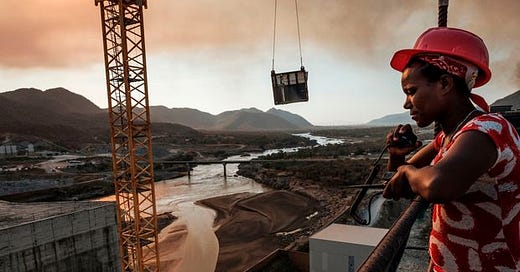Emerging Markets Daily - July 11
Egypt-Ethiopia Nile Clash Looms, G-20 Tax Deal, Abiy Ahmed Wins Re-election, Botswana Woos China for Coal Projects, Blockchain and Asian Trade
The Top 5 Emerging Markets Stories from Global Media - July 11
Egypt and Ethiopia Clash Over Nile River Dam as Water Scarcity Looms World-Wide
The Wall Street Journal
“A dispute over the Nile, the world’s longest river, is coming to a head. At stake are the lives and livelihoods of millions of people who depend on its water.”
“…Egypt and Sudan have lobbied the United Nations, the U.S. and other countries to stop Ethiopia from filling the dam before the three countries reach a legally binding agreement over its operation. U.N. Security Council members on Thursday backed the African Union’s efforts to mediate the dispute.”
“…According to a 1959 agreement, Egypt receives 55.5 billion cubic meters of water from the Nile each year, while Sudan can draw 18.5 billion cubic meters. Ethiopia receives no water from the Nile, but the new dam would have a storage capacity of 74 billion cubic meters of water.”
“Egypt currently has a water shortage. The U.N. expects it will face water scarcity issues by 2025.” Amira El-Fekki and Andrew James report
G20 Economy Ministers Endorse Global Tax Deal
Financial Times
“The world’s largest economies have thrown their weight behind a global tax reform deal that would impose a minimum levy on multinational corporations, ramping up pressure on a small number of holdout countries to sign on to the agreement.”
“G20 economy ministers and central bankers meeting in Venice on Saturday issued a joint communiqué endorsing the tax deal, which was agreed by G7 nations last month and backed by 130 countries at talks hosted by the OECD in Paris.”
“Eight countries, including Ireland, Barbados, Hungary and Estonia, have deferred agreeing the 15 per cent minimum levy, which is backed by the US, China, India and most EU countries. Other holdouts include Sri Lanka, Nigeria, Kenya and St Vincent & the Grenadines.” Miles Johnson reports
Geopolitics: Ethiopia Election: Abiy Ahmed Wins with Huge Majority
BBC
“Ethiopian Prime Minister Abiy Ahmed has won the country's delayed elections with an overwhelming majority, the election board said on Saturday.”
“The board said Mr Abiy's Prosperity Party won 410 out of 436 seats, giving him another five-year term in office.”
“However, a fifth of the country failed to carry out voting overall due to insecurity and logistical problems.”
“Polls were not held in the war-torn Tigray region, where many thousands are living in famine conditions.” BBC News reports
Botswana Woos Chinese Investors as Lenders Shun Coal Projects
Bloomberg Green
“At a time when funding for fossil fuel projects is drying up, Botswana is racing to develop six new coal mines and a rail link for exports, with the government prepared to put its own money into the projects.”
“The southern African nation, the world’s second-biggest diamond producer, has more than 200 billion tons of untapped coal reserves. To kickstart the industry, it has turned to investors from the largest global coal consumer, China.”
“The appeal to the group led by the Africa Guangdong Business Association comes as banks are increasingly shying away from funding coal projects because of its impact on global warming. Yet demand for the fuel, especially in Asia, remains high and prices have risen to a record because of tight supply.” Antony Sguazzin reports
Blockchain Greases Trade Wheels between 7 Asian-Pacific Economies
Nikkei Asia
“One of lessons the coronavirus pandemic has brought into sharp relief is the need for contingency plans. Whether it's relying too much on one country for crucial medical supplies, a sudden closure of borders and shipping routes or an impromptu trade war, businesses must being able to adapt quickly.”
“…Now, Japan and six other Asia-Pacific economies are closing in on establishing a cross-border trade network that could eventually grant 5,000 businesses online access to suppliers across the region at a moment's notice and cut down on the headaches caused by supply chain disruptions.”
“In Japan, companies will connect to the network through TradeWaltz, a blockchain-based trade data sharing platform. There, businesses will be able to share digitized documents, and clerical work involving trade will be rendered paperless.” Fumie Yaku reports



